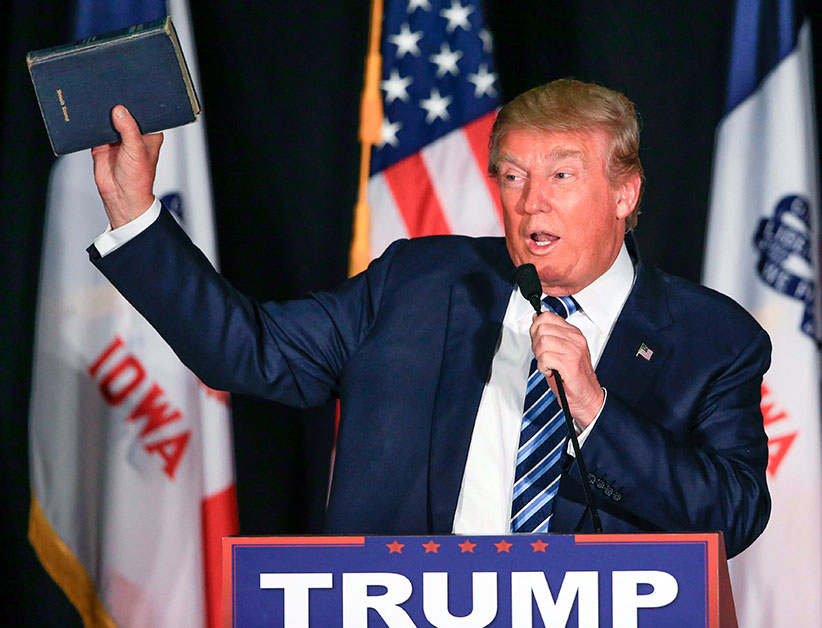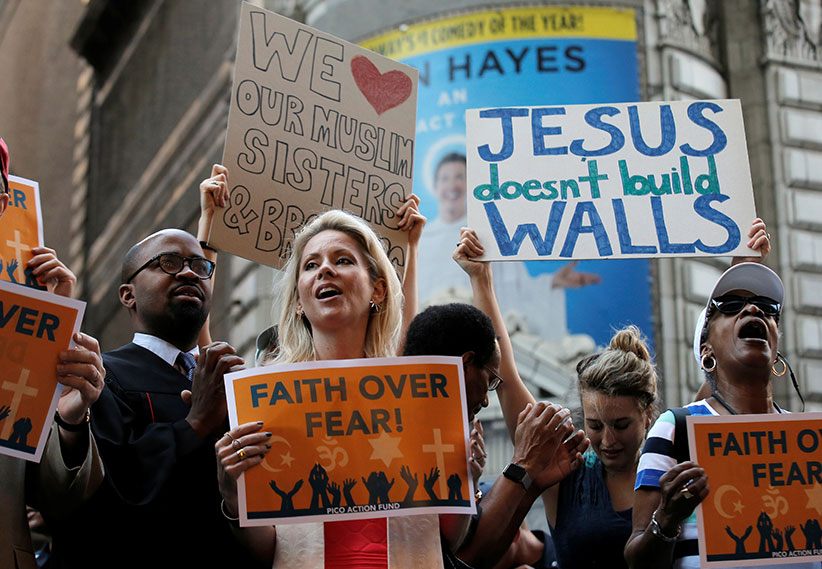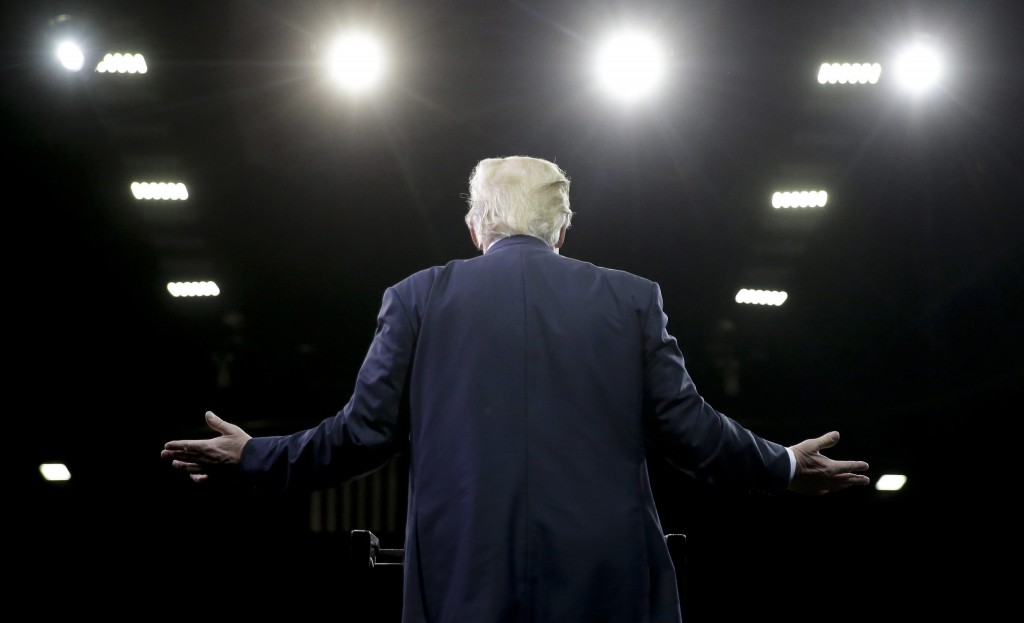How Donald Trump is dividing evangelical Christians
The divisive Trump has fractured the Republican Party’s longtime alliances—and it could dramatically reshape U.S. politics
A group of interfaith religious leaders protest against Republican U.S. presidential candidate Donald Trump outside a hotel where he was to meet with evangelical leaders in New York City, U.S., June 21, 2016. (Brendan McDermid/Reuters)
Share

For more than a year now, Donald Trump has been the genie of disruption in American national politics. The presumptive Republican nominee has brought polar opposites together, if only in shared loathing. Elizabeth Warren, Democratic senator and scourge of Wall Street, and Mitt Romney, the wealthy 2012 Republican presidential candidate—both of whom have called Trump a “fraud” unfit for the Oval Office—can scarcely have a single other name in common on their enemies lists.
And he has driven a deep wedge into old alliances, something captured in an explosive, Trump-inspired tweet from Southern Baptist pastor Russell Moore, perhaps the most prominent anti-Trump Christian leader in the country, calling popular televangelist Paula White “a charlatan and a heretic.”
MORE: Why it matters if Trump can make Youngstown, Ohio, great again
Trump has caused—or rather exposed—fault lines right across Republican politics. But no other fracture is as potentially transformative, in partisan and national terms, as the stresses Trump is placing on the vote-rich leg of the Republicans’ famous three-legged stool: the 40-year-old embrace between the party and socially conservative evangelical Christians.
That alliance and political evangelicalism itself are heading for an “irrevocable” divorce, according to David Gushee, an evangelical professor of Christian ethics and director of the Center for Theology and Public Life at Mercer University outside Atlanta. It’s not entirely because of Trump, says Gushee, but his political rise correlates with it, and his campaign rhetoric has provided the flashpoint. “Before Trump, the deal held,” says Gushee. In exchange for ballot-box support, “the Republicans basically handed over social policy to conservative white evangelicals who for 40 years functioned as the Republicans’ state church,” keeping the party onside in opposition to abortion, same-sex marriage and transgender rights.
Yet there were always dissenters, adds Gushee, especially “evangelicals of colour, women and younger people, who didn’t think the bioethical-sexual issues were everything, who are concerned about racism, poverty, the death penalty, Islamophobia.”
[widgets_on_pages id=”republican-convention-2016_2″]
Still, for “eight or nine” elections, only progressive evangelicals—a minority faction almost invisible to secular America—“wouldn’t show up to vote Republican in November,” says Gushee. “Then along comes Trump to shake things up.” Some socially conservative evangelicals, like the Southern Baptists’ Moore, found themselves unable to climb aboard the Trump express. As a result, says Gushee, only about 55 per cent of American evangelicals support Trump, a good 20 points below the backing recent Republican nominees received.

Some of the reasons for rejection cut across the secular-religious divide—Trump’s enthusiastic embrace of torture, his mocking of a disabled reporter, his racist denunciations of the judge hearing the case against Trump University—while others are more specifically religious. Many do not trust the candidate’s late conversion to orthodoxy on abortion and LGBTQ issues, and are incensed by recent suggestions of wholehearted conversion. It was the claim by evangelical eminence James Dobson that Trump had been led to the status of “baby Christian”—meaning born-again evangelicalism—by Paula White that led to Moore’s disbelieving Twitter blast. (Trump is a Presbyterian, whose experience of Christianity seems to add up to little more than recalling times “when I drink my little wine and have my little cracker.”)
But nothing is roiling the waters of American Christianity, well beyond the boundaries of a divided evangelical world, like the question of, in Gushee’s phrase, “what to do with Muslims.” Religious liberty is the current rallying cry of conservative Christians. At bottom, the concept represents their demand for legal protection in their recoil from new sexual mores, or, as their critics would put it, the right to discriminate on the grounds of religious belief against LGBTQ Americans. Religious liberty is the principle cited in North Carolina’s notorious transgender bathroom law and a host of other recent state bills.
It’s also the principle the Roman Catholic hierarchy championed in its campaign against the Obama administration over provisions in the Affordable Care Act compelling employers to provide contraception coverage in their health care packages. “The bishops have long been reliable culture warriors for the Republicans,” says Massimo Faggioli, head of the Institute for Catholicism and Citizenship at the University of St. Thomas in Minnesota, “and that’s why they own a little bit of the current situation, and why Trump has paralyzed them into silence.”
Faggioli was referring to the larger meaning of religious freedom, which for powerful forces in American Christianity extends far beyond the right to refuse to pay for birth-control bills or provide flowers for a gay wedding. Trump’s proposed ban on Muslim immigration and the claims of not-so-far-right American evangelicals—including such prominent Trump supporters as Tony Perkins, head of the Family Research Council—that Islam is not a religion worthy of constitutional protection, repels many Christian leaders. Their ranks include bishops who recall Catholics’ long status as second-class Americans; pastors like Moore, for whom the Baptist concept of “soul liberty” is paramount; and, seemingly, the entire Mormon population.
The Church of Latter-day Saints, full members of the Republicans’ religious wing as recently as 2012, when Mitt Romney became the first Mormon to secure a major-party presidential nomination, have proved notably cool to Trump’s charms. The central sticking point arises from their collective memory. Trump’s first demand for a Muslim entry ban in December brought a rare rebuke from the institutional church: “The LDS is not neutral in relation to religious freedom,” read a statement that also cited founder Joseph Smith’s comment that such policy could easily be turned on “any other denomination who may be unpopular and too weak to defend themselves.” More recently, Utah senator, Mormon and archconservative Mike Lee was more specific in explaining his refusal to back Trump, referencing the 1838 order from the governor of Missouri for the “extermination” of Mormons.

Fuelling the kaleidoscopic reshaping of the American religious mosaic is the knowledge—old hat to the Catholic hierarchy, but unsettlingly new for evangelical leaders—that the flocks are not following the shepherds. With the exception of the Mormons, that is, whose solidarity has brought new respect from the left and a return to old they-never-were-a-part-of-us attacks from some evangelicals.
Catholic bishops know Trump would not be where he is now if millions of working-class Catholics hadn’t voted for him in northeastern primaries. That support underscored the way Trump emerged undamaged from his clash with Pope Francis over how Christian it was to erect a wall on the southern border. Awareness of Trump’s appeal helps explain the episcopal silence, says Faggioli: “They are hoping something happens to him, perhaps at the convention, before they have to say anything. But at some point, they are going to have to test their political capital and speak out about the Muslim ban and the migrant issue.”
For their part, evangelical pastors were shocked by the results of the South Carolina Republican primary in March, when Trump swept to victory in a heavily evangelical state despite an overwhelming preference for rival Ted Cruz among Christian leaders. There are, evidently, cultural evangelicals to parallel cultural Catholics, notes Gushee. “The primary showed a class division between the grassroots—an angry white working class, some of whom self-identify as evangelical—and church leaders.” Faggioli agrees with Gushee that the old issues of the culture wars, notably abortion and even LGBTQ rights, are losing their hold over churchgoers: “Economic and nativist factors are now salient,” in the latter’s words.
The response among the originally pro-Cruz leaders to Trump’s ascendancy has split along political, theological and even generational lines—The Atlantic magazine headlined the announcement of Trump’s evangelical advisory board as “Return of the ’90s.” Younger leaders have been less inclined to accept their elders’ “Paris-is-worth-a-mass” response to Trump’s promise of “pro-life” justices on the Supreme Court, not if the price is the destruction of American religious freedom. No matter how the election unfolds, it’s scarcely possible all the fractures will be healed, and far more likely the political future of American Christianity will take a new turn.
Read more Maclean’s, news and politics on Texture. Anytime. Anywhere. All in one app.